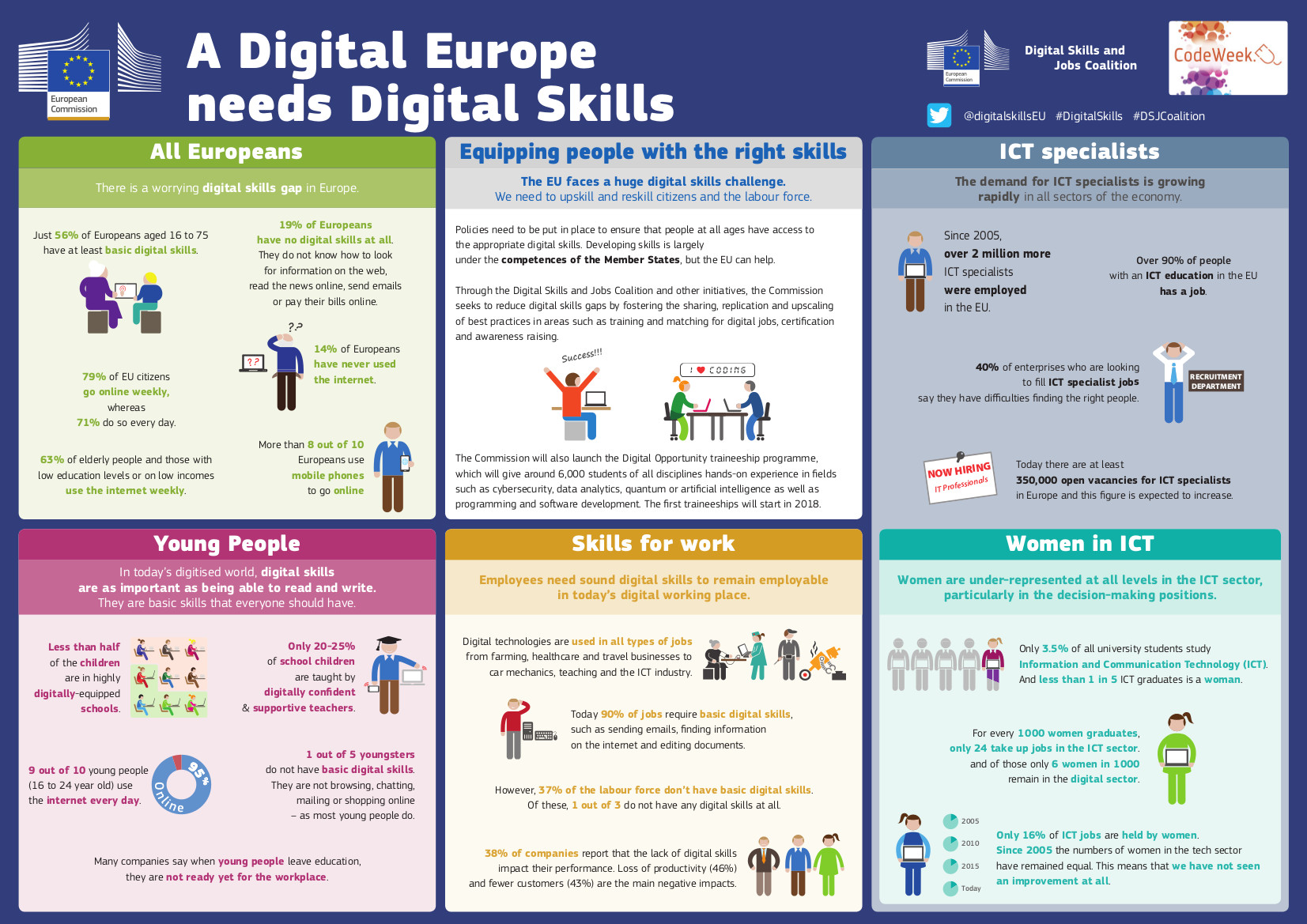“Today’s initiatives aim at empowering individuals so that they can make the most of their lives and so that we can build fair, resilient economies and societies”

“Europe’s education and training systems need to give people from all backgrounds the right competences to progress and prosper professionally, but also enable them to be engaged citizens“

“The digital age is expanding into all areas of our lives, and it is not just those who work in IT that will need to be alert of the digital transformation“

TAKE CONTROL OF YOUR DIGITAL LIFE.
DON’T BE A VICTIM OF CYBER SCAMS!
Scroll down to “Skills for cybersecurity” for more…

As technology and innovation are changing the financial industry, the needs for human skills and talent are evolving as well. Ensuring that financial services providers and their human capital remain competitive and future-proof, is an essential part of the work of EBF. In Europe alone, banks are employing approximately 3 million people. Now that banks around the world are assessing their digital optimisation strategies, attention to the well-being of the human workforce is more important than ever. The EBF Facts & Figures of 2017 showed a decrease of 50,000 people compared to the year before. The number of bank branches is slowly decreasing as customers are resorting to virtual channels. Moreover, automation is applied to back-office tasks, risk management, big data analytics. The rise of artificial intelligence provides opportunity to create support and chatbots but is also used for automated trading and robo-advice. According to the European Commission technology is changing the structure of employment, leading to the digitalisation of routine tasks and enabling the creation of new, different types of jobs.
ALIGNING WITH THE AMBITION OF THE EUROPEAN COMMISSION
Data shows that, currently, 44% of European citizens do not have basic digital skills. 37% of people in the labour force – farmers, bank employees and factory workers alike – also lack sufficient digital skills, despite the increasing need for such skills in all jobs. It is estimated that there will be 500,000 unfilled vacancies for ICT professionals by 2020. A real digital skills gap.

The European Commission is promoting various initiatives aimed at increasing training in digital skills for the workforce and for consumers; modernising education across the EU; harnessing digital technologies for learning and for the recognition and validation of skills; and anticipating and analysing skills needs.
On 17 January 2018, the European Commission adopted the Communication on the Action Plan on Digital Learning. The Action Plan outlines how the EU can help individuals, educational institutions and education systems to better adapt for life and work in an age of rapid digital change by making better use of digital technology for teaching and learning. Read more
As a strong supporter of the Digital Single Market initiative of the European Commission and with a clear focus on empowering human capital, the EBF firmly believes in enhancing the core digital skills of citizens, consumers, customers and employees of the financial sector. See also EBF response to the EC Proposal for a European Cybersecurity Industrial, Technology and Research Competence Centre

Downoad the European Commission Factsheet “A Digital Europe needs Digital Skills”
DIGITAL SKILLS AND JOBS COALITION
 EBF is a proud member of the Digital Skills and Jobs Coalition, created by the European Commission. EBF became a member in April 2017 and is set on contributing to the related meetings and initiatives ever since. The Coalition brings together European member states, companies, social partners, non-profit organisations and education providers, who take action to tackle the lack of digital skills in Europe. Read more
EBF is a proud member of the Digital Skills and Jobs Coalition, created by the European Commission. EBF became a member in April 2017 and is set on contributing to the related meetings and initiatives ever since. The Coalition brings together European member states, companies, social partners, non-profit organisations and education providers, who take action to tackle the lack of digital skills in Europe. Read more

SKILLS FOR CYBERSECURITY
Skills and awareness in the digital space are essential also for personal security. The EBF Digital Skills strategy is therefore very closely linked with its work on cybersecurity. EBF has joined forces with Europol EC3, the European Cybercrime Center of the EU Agency for Law Enforcement Cooperation, promoting awareness on digital security and cybercrime. On the 2017 edition of the annual EBF Cybersecurity Conference digital skills were one of the main topics discussed with a panel of experts. EBF is also regularly supporting the European Cybersecurity Month, organised by ENISA every year in October.
EBF Cybersecurity Conference 2018 – Active defence in banking
EBF Cybersecurity Conference 2017 – special focus on digital skills
Europol EC3, EBF, Eurojus Joint Press release: Over 1500 money mules identified in worldwide money laundering sting
Europol EC3 – EBF awareness campaign on Cyberscams: Take control of your digital life!
Press release: Europol & EBF launch campaign on 7 most common online financial scams
Europol – awareness and prevention guides
Press release: Europol & EBF join forces to fight cybercrime
OTHER RESOURCES
DESI Index
The Digital Economy and Society Index (DESI) tracks the evolution of EU member states in digital competitiveness, measuring different factors that determine digital progress of a country. Read more
Digital Opportunities – traineeships
The Digital Opportunity traineeship initiative will provide cross-border traineeships for up to 6,000 students and recent graduates between 2018 and 2020. The aim is to give students of all disciplines the opportunity to get hands on digital experience in fields demanded by the market. Read more
Digital skills and financial education
The way we manage and understand money is drastically changing due to digital transformation. The work of EBF on financial education touches upon these developments. During the European Money Week a special focus will be places on FinTech and Digital Skills in the context of financial education.
European Money Week
European Money Week – Web page
European Money Week – FinTech Tools & Digital Skills seminar
European Money Quiz – practice questions on digital security
European Money Quiz – Kahoot! Digital Security question 1
European Money Quiz – Kahoot! Digital Security question 2








